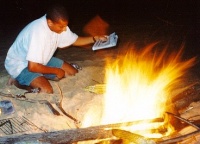 We each offer a product or a service daily. Often the product we offer is our capacity to be a better spouse, parent, employer or employee. “A Feast Fit for a King” is particularly relevant for people in sales though each of us “sells” constantly in some way, shape or form.
We each offer a product or a service daily. Often the product we offer is our capacity to be a better spouse, parent, employer or employee. “A Feast Fit for a King” is particularly relevant for people in sales though each of us “sells” constantly in some way, shape or form.
When is the best time to ask someone to make a decision about our offer?
The most obvious answer is when the recipient has all the information and is predisposed to accept our suggestions.
Suppose we are preparing a Feast Fit for a King for someone special. We go to the supermarket, buy the ingredients for the meal, a nice bottle of wine and candles to create the perfect atmosphere.
While we prepare the meal, we think of all the details. The precise moment to put each course into the oven, the table setting and the music we want to hear. When everything is ready, we sit down at the table with our loved one to enjoy a Feast Fit for a King.
When is the best time to enjoy each succulent bite?
It is in that instant, of course!
Something similar happens when we talk to a client. We diligently do the following:
Contact the person
Qualify their capacity to buy
Investigate necessities and desires
Present our offering in terms of benefits
Respond to concerns with confidence and conviction
After we have expertly followed each step, we can ask for a decision without fear and without fumbling. While the words are not nearly as important as the intent, we can say, for example, “Let’s get things going; I just need your approval.”
Amazing as it may seem, studies have shown the majority of sales calls end without the salesperson ever asking for the order! At the end of the presentation, the salesperson typically mumbles something like, “What do you think?” to which the person eloquently replies, “Let me think about it, and I’ll call you…”
We know from experience, the promise of “I’ll call you…” is typically an empty promise designed to get rid of salespeople.
What can we do?
 Just as the best time to eat a Feast Fit for a King is in this instant, the best time to highlight the benefits of our offer and to ask someone to make a decision is at the same time we have given them all the information they need.
Just as the best time to eat a Feast Fit for a King is in this instant, the best time to highlight the benefits of our offer and to ask someone to make a decision is at the same time we have given them all the information they need.
If we put our Feast Fit for a King in the refrigerator and take it out the next day, it may still taste great, although it may never be as good as the moment it was first prepared. Similarly, a person is most likely to make a favorable decision immediately after we have “served” our proposal.
Rather than packing our bags and heading for the nearest exit in defeat, we should do everything possible to urge people to make a decision now and not later. Often, the worst thing we can do is to do nothing at all.
While there are no magic words or secret formulas to achieve our objectives 100% of the time, we can enter into every situation prepared to give our very best with confidence we will achieve our purpose. When we take action and ask people to make a decision, we determine our direction and drive our destiny.
In April, 2005 Lunar Letter, we conducted a survey regarding the following question:
“How do you overcome Fears, Uncertainties and Doubts to be more productive?”
The most frequent response from our readers was to, “Take Action!”
Take action today to empower excellence tomorrow.
@RobMcBride
May 2005
 From the day we enter this wonderful world until they day we depart to a reality yet unknown, we face problems and challenges.
From the day we enter this wonderful world until they day we depart to a reality yet unknown, we face problems and challenges.
 They are in fact one in the same! It’s a question of attitude and vision. What appears to be a problem without resolution today, often results in a challenge fostering growth and creativity.
They are in fact one in the same! It’s a question of attitude and vision. What appears to be a problem without resolution today, often results in a challenge fostering growth and creativity.

 Sometimes we are up and inspired; at other times we are down and uninspired.
Sometimes we are up and inspired; at other times we are down and uninspired. Inspiration and motivation create a flame which gives us warmth and sustenance, as it did for our ancestors thousands of years ago.
Inspiration and motivation create a flame which gives us warmth and sustenance, as it did for our ancestors thousands of years ago.


 Communication is the only tool we have to understand others and to express our ideas. Unfortunately, it tends to be a skill we learn only by trial and error and not through formal schooling. The art of effective communication is seldom part of our educational curriculum.
Communication is the only tool we have to understand others and to express our ideas. Unfortunately, it tends to be a skill we learn only by trial and error and not through formal schooling. The art of effective communication is seldom part of our educational curriculum.
 We each offer a product or a service daily. Often the product we offer is our capacity to be a better spouse, parent, employer or employee. “A Feast Fit for a King” is particularly relevant for people in sales though each of us “sells” constantly in some way, shape or form.
We each offer a product or a service daily. Often the product we offer is our capacity to be a better spouse, parent, employer or employee. “A Feast Fit for a King” is particularly relevant for people in sales though each of us “sells” constantly in some way, shape or form.
 Just as the best time to eat a Feast Fit for a King is in this instant, the best time to highlight the benefits of our offer and to ask someone to make a decision is at the same time we have given them all the information they need.
Just as the best time to eat a Feast Fit for a King is in this instant, the best time to highlight the benefits of our offer and to ask someone to make a decision is at the same time we have given them all the information they need. Our lives are a collection of emotions and events which mold us with power and satisfaction or with weakness and discontent. In his book Thinkertoys, Michael Michalko mentions three elements which kill creative energy and control many of our thoughts and actions.
Our lives are a collection of emotions and events which mold us with power and satisfaction or with weakness and discontent. In his book Thinkertoys, Michael Michalko mentions three elements which kill creative energy and control many of our thoughts and actions.

 FUDs are frequently the cause of our most trying times. I suggest we Fire the FUDs! Just get rid of them. When Fear, Uncertainty or Doubts enter our mind, we must have the power to replace them with Conviction, Certainty and Confidence.
FUDs are frequently the cause of our most trying times. I suggest we Fire the FUDs! Just get rid of them. When Fear, Uncertainty or Doubts enter our mind, we must have the power to replace them with Conviction, Certainty and Confidence.

 Companies, like people, must Bounce back from challenging situations if they want to remain in business. It is imperative to rise and roar after falling or failing in order to soar with the eagles.
Companies, like people, must Bounce back from challenging situations if they want to remain in business. It is imperative to rise and roar after falling or failing in order to soar with the eagles.
